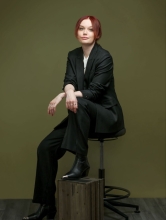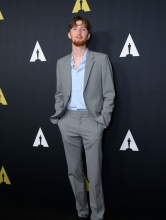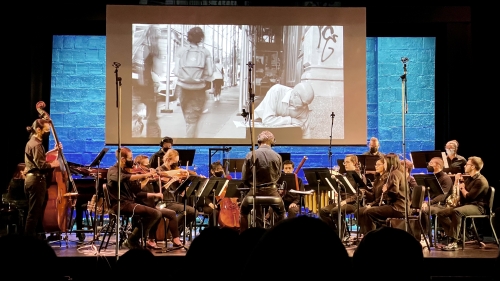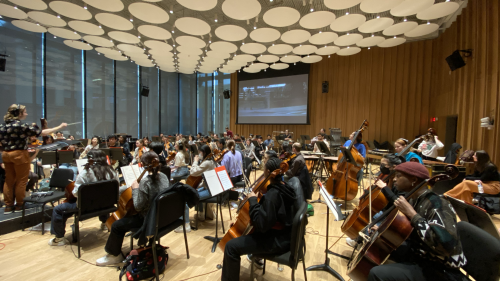NYU Screen Scoring congratulates Aurélie Webb (Steinhardt ’20), Elizabeth Phillipson-Weiner (Steinhardt ’21), and Cal Freundlich (Steinhardt ’22) who respectively scored all three Student Academy Award winning documentaries of 2022! These alumni each earned their Master of Music in Music Theory and Composition from NYU’s Screen Scoring program.
Underscoring their impressive accomplishment, the three films, Found, Here to Stay, and Seasons, won gold, silver, and bronze medals respectively. We had the chance to speak with all three winners to learn more about their respective projects, accomplishments, and time at NYU.
Aurélie Webb - Here to Stay

Webb scored Here to Stay directed by Jared Peraglia. The film’s synopsis reads “Here to Stay follows the campaign of Giselle Martinez - a 23-year-old, first generation Mexican American woman - who runs for office in one of the most dangerous cities in America, Newburgh, New York.”
How did you become part of this collaboration?
I completed my master's program in Screen Scoring at NYU in 2020. Jared Peraglia, the director, and most of the production crew were in undergrad at NYU at a similar time. It wasn't until after I'd graduated and left that we connected through a filmmaker friend, whose project I had previously worked on. We hit it off and the rest is history.
What aspects of the film resonated with you most?
The humanity of it, it's a very real story. Giselle Martinez, who we follow, is young and determined. She doesn't let anything get in the way of life or on the campaign trail for Newburgh city council. She does everything for other people, the campaign is for her Mexican cultural representation, it's for her family, it's for her community. It was so inspiring to watch her journey. We followed her political campaign for Newburgh City Council and we didn't know when we first started the documentary that she was going to win. Following her journey in the same way that the audience does, you’ll go through her struggles and you’ll understand more about why she's doing it. You can see the pain she goes through as well. It's just so human and relatable, especially for people in our generation. She was just doing her thing and making the best out of her situation and out of her life, which is very inspiring.
What was the process of scoring this film like?
I was brought in probably halfway through the editing process. Everything had pretty much been shot, except footage from the last few weeks of the political campaign. They had a strong idea of what they wanted the music to be, but they also wanted to give me a lot of freedom, which was wonderful. So I came in at that point where the picture was still changing, which was nice because I was able to develop the music in response to the changing edits. From there it was quite a natural process. They gave me some music that they've been inspired by and that gave an overall tone and flavor that I was able to follow. As I usually do with my process, I did a first look and I sent it back to Jared who gave me more ideas and thoughts. It's always a collaboration and brainstorming between the composer and the rest of the team.
Were there any particular challenges?
It was quite unusual, honestly. You don't always have such a smooth process. I was coming out of a busy project, so at first I wasn't sure if I would even have time or the mental capacity to immediately take on something new. I'd been wanting to do a documentary for a long time, and Jared was just fantastic and the story was VERY interesting so I made the time to do it. The whole team is very, very talented, they know what they want to do. They made the whole process so enjoyable.
How did you connect to the narrative and social themes with your composition? Did you use any particular instrumentation or style?
It goes back to what I was saying earlier about Giselle being so relatable. With a documentary, it's very important that you don't impose your own layer of thinking because it's not fiction. I was inspired because it was a very human and relatable story. The way I interpreted it was through strings. There's a lot of solo cello; it's mostly synthesizer. In a way, I wanted the cello to represent Giselle. I'm not sure if I can explain why I feel this way, but I've always felt like the cello is quite human. I think it's so resonant and beautiful and it just felt very natural to have that sort of sound. I'm a cellist as well, so I often write for cello. That was putting a stamp of my own on it.
Was there anything that drew you to this project in particular? Did working on this film impact you personally in any way?
I think it was as simple as having a conversation with Jared and watching the first rough cut of the picture. It was beautifully shot, and very sensitively portrayed. Jared had such faith in it. If the energy is good with a production team, it inspires everyone involved to do the best job they can. I immediately wanted to work with them.
I studied at NYU and was in Manhattan, I didn't have a chance to travel anywhere else in the state. I had no idea that Newburgh, where this was filmed, was such a poor area, and that it's been kind of written off. I think that's what Jared wanted to show people.
It's a place that is kind of forgotten, but there's still people living there and going about their lives. It was nice to have that little bit of hope that there are still people like Giselle who are staying put. She’s trying to make her home a better place. It's heartwarming to know there are still good people in the world that are trying to make the world a better place.
Is there anything else that you'd want to add about the project?
Thank you so much to the team for reaching out, because it's an NYU film, it's lovely to talk and spread the world. Thank you to NYU Screen Scoring as well for putting us all in this position because we would never have met without them.
Elizabeth Phillipson-Weiner - Seasons
Elizabeth Phillipson-Weiner (MM 2021)
Phillipson-Weiner scored Seasons directed by Gabriella Canal and Michael Fearon. The film's synopsis reads “For Nevia No, farmer and owner of Bodhi Tree Farms in New Jersey, the seasons are a way of life. But along with the beauty of producing food and working the land comes a lifestyle of uncertainty as she grows older.” The film was published by The New Yorker in 2022.
How did you become part of this collaboration?
Seasons was the second film I worked on with director Gabriella Canal. I had previously worked with her on No Man’s Land, and she reached out to me early in the process when they were still in production because they needed a composer.
What aspects of the film resonated with you most?
Seasons is a mother/daughter story, and what the film did so well was capture the complexity of their relationship. I don’t have the kind of relationship with my mother that you see in the film, but there’s something so intimate, yet explosive and fraught about this sort of relationship. I think it’s funny and sweet and difficult all at the same time. The question of legacy and wanting to pass something on to your kids also resonated with me. I think our parent's generation felt they had to make sacrifices for our generation. Our generation is more of the attitude we want to do what we want, which is really because of the sacrifices our parents made.
What was the process of scoring this film?
The film takes place at Bodhi Tree farm located in New Jersey. It’s a beautiful, serene setting. We approached the score via both the setting and the characters. For the farm setting, the score took on an Americana/Folk feel. Another key location in the film are flashbacks scenes to North Korea, where the mother character Nevia, was born. For this we incorporated traditional Korean instrumental sounds. Nevia also used to be a dancer. I wanted to give this part of the score a romantic sound, something you might hear in a dance studio. The main score I used for her time talking about her life as a dancer was very string based, and then I echoed the same theme in the daughter's music. The daughter, Euni, is such a product of her mother so their themes were intertwined, but both had a distinct sound.
When the film flashes back to North Korea, I added sounds that were more “vintage-y.” I put tape delays on the score, and I used plucked strings that were reminiscent of the classical Korean instruments that Nevia plays, which root us in the location. We basically started with strings and transformed the sound and arrangements for each location and emotional change in the film.
Were there any particular challenges?
It was honestly a smooth process. It's great working with Gabriella and it was wonderful working with Michael for the first time. The filmmakers understood the heart of the film and were able to convey it to me. It made my job easy. I just had to implement the emotions that we talked about and translate them into music.
How did you connect to the narrative and social themes with your composition?
It was important musically to have mirroring mother/daughter themes that eventually intertwined at the end. We start with a mother and daughter, and don’t fully understand what their relationship is all about. As we get deeper into their story, we learn there are a lot of mixed emotions about the choices Nevia has made in order to support her family. The musical theme unravels over the course of the film as we discover the depth and pain between Nevia and Euni. Eventually, Euni connects with her mom and understands why she had to make the sacrifices she did. I think my connection to the material came from being a daughter. Though my relationship with my mom is not the same as the relationship depicted in Seasons, I immediately connected with the complexity and challenges shown between mother and daughter. The fact that their relationship was simultaneously stoic and loving, painful, but silly, I really connected with those juxtapositions personally. I think the thing that is particularly beautiful about the story is that in it, everyone is truly doing their best with the best of intentions. It shows that in life conflict can arise despite everyone's best efforts.
Was there anything that drew you to this project in particular?
I just loved the project. When I first saw it, it touched me personally. I have two sisters, and we’re a family of daughters and moms, and I think that is the heart of this story.
I also appreciated the natural aspect of it. I’m a folk/Americana artist as well, and I think being able to create a new take on scoring these landscape types of films was special. The film is beautiful and bucolic. We approached it with romantic era classical music combined with classical elements from Korea. I think it's interesting how we wove the sounds together.
Cal Freundlich - Found

Freundlich scored Found directed by Shuhao Tse. The synopsis reads “Tang's son was stolen when the child was three. Twelve years later, the police find him, but that joy is trapped by a new reality.”
How did you become part of this collaboration?
I was in NYU’s Screen Scoring Program and I had done a collaboration my first year with the Carter Journalism Program. I met a lot of great filmmakers and one in particular, Bohao Liu, had made a documentary called Eagles Rest in Liangshan, which I worked on with Kelvin Yuen. The following year, there was an opportunity, to collaborate again. Bohao connected me with Shuhao Tse, because he knew we had common interests (basketball), and would work well together. I looked up Shuhao, and saw the clip he had done for the Screen Scoring and Carter Journalism collaboration and was instantly captivated by it. I reached out to him. I am very lucky because I worked with two great filmmakers, and the first one connected me to the second one.
The story follows Tang and his family, whose son was abducted at age three. We pick up 12 years later, when the police have found him, but he has to reconcile the time lost and, as Shuhao says, “that joy is trapped in a new reality.”
What aspects of the film resonated with you most?
It’s a family story, and what struck me the most other than Shuhao’s cinematography, was that it’s such an intimate and close story. It is so emotional and kind of unbelievable that he was able to capture it. I was so attracted to the intimacy and the carefulness in which he had to tell the story. Although I didn’t know it when I first started, it is a narrative film through Shuhao’s storytelling. I think the most powerful documentaries are the ones that are told like stories.
What was the process of scoring this film like?
Because it was so highly emotional and personal to this family, the biggest struggle was figuring out how we were going to score it without telling the audience how to feel. We landed on a few things, which were a celeste (which is a child’s piano), a regular piano, and then a little guitar here and there. Keeping it small allowed the story to speak for itself while giving the audience gentle pushes toward real feelings that we were seeing on screen. One of the biggest challenges was how we were going to do this without being over the top. The story is already so emotional we didn’t need a lot of scoring for the audience to feel.
Were there any particular challenges?
I think the delicacy of it all was the hardest part - it was delicate because it was personal to the family. Shuhao wanted to be fair to everyone with his directing and I wanted to be fair in my score. When we speak about fairness, it also means being fair to the audience. Allowing them to digest what they’re seeing as it’s emotional and real. Finding a way to do that was the hardest part, and once we reached this one main theme that we dissected it a bunch of different ways, it felt like we had tied the story together.
How did you connect to the narrative and social themes with your composition?
It was hard to not feel connected to this story; how personal it was, the closeness in which they shoot the characters and hear from them, especially the parents. Being a son, loving my parents and loving my family, I can imagine how hard this would be from either side whether you’re the child or the parent. Imagine being presented to the people that birthed you and raised you for the first years of your life and then lost you. The darkness and fear of losing someone like that is powerful no matter who you are in that scenario.
Was there anything that drew you to this project in particular?
I’m always excited to work with new people. What I look for in a filmmaker is someone who is creating something that has meaning to them. I have been to award ceremonies and festivals for the film and people are extremely moved by the story. This speaks to how carefully Shuhao crafted it and his ability to capture moments.


